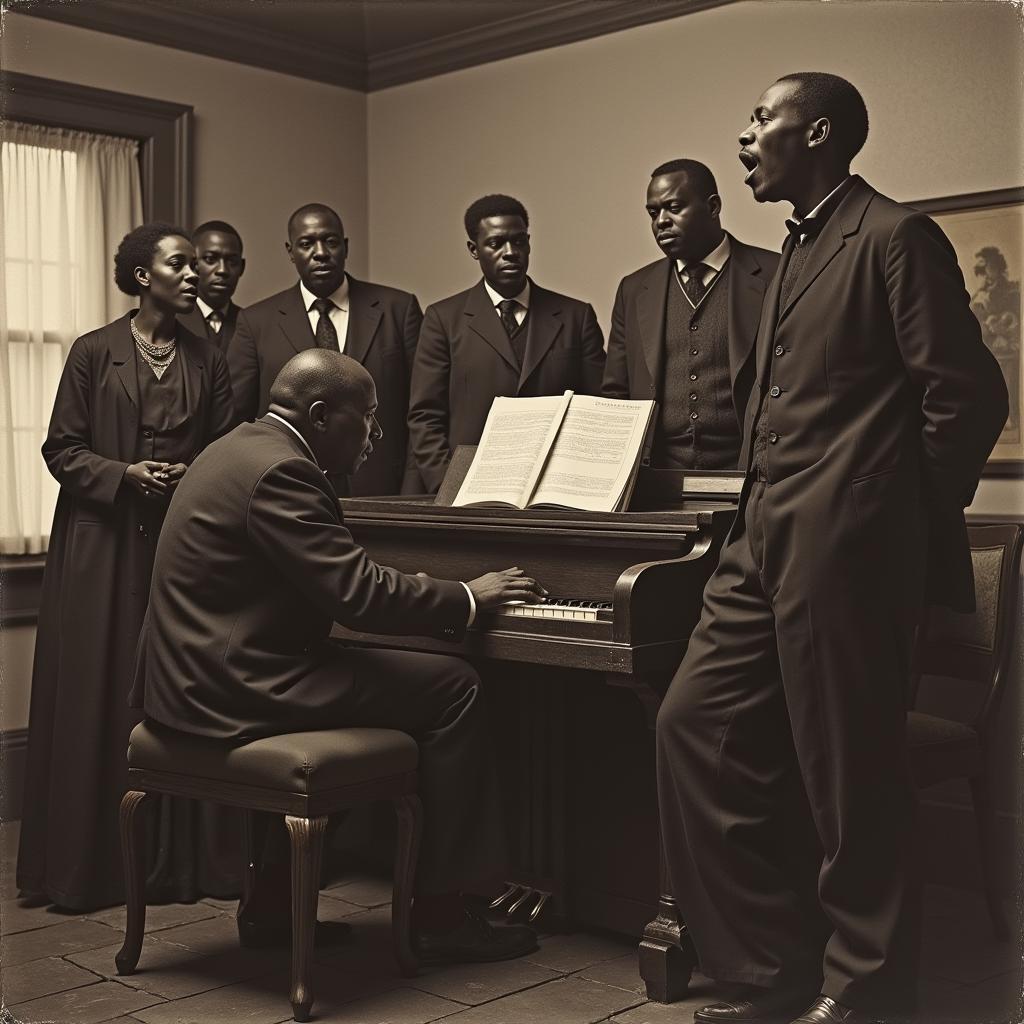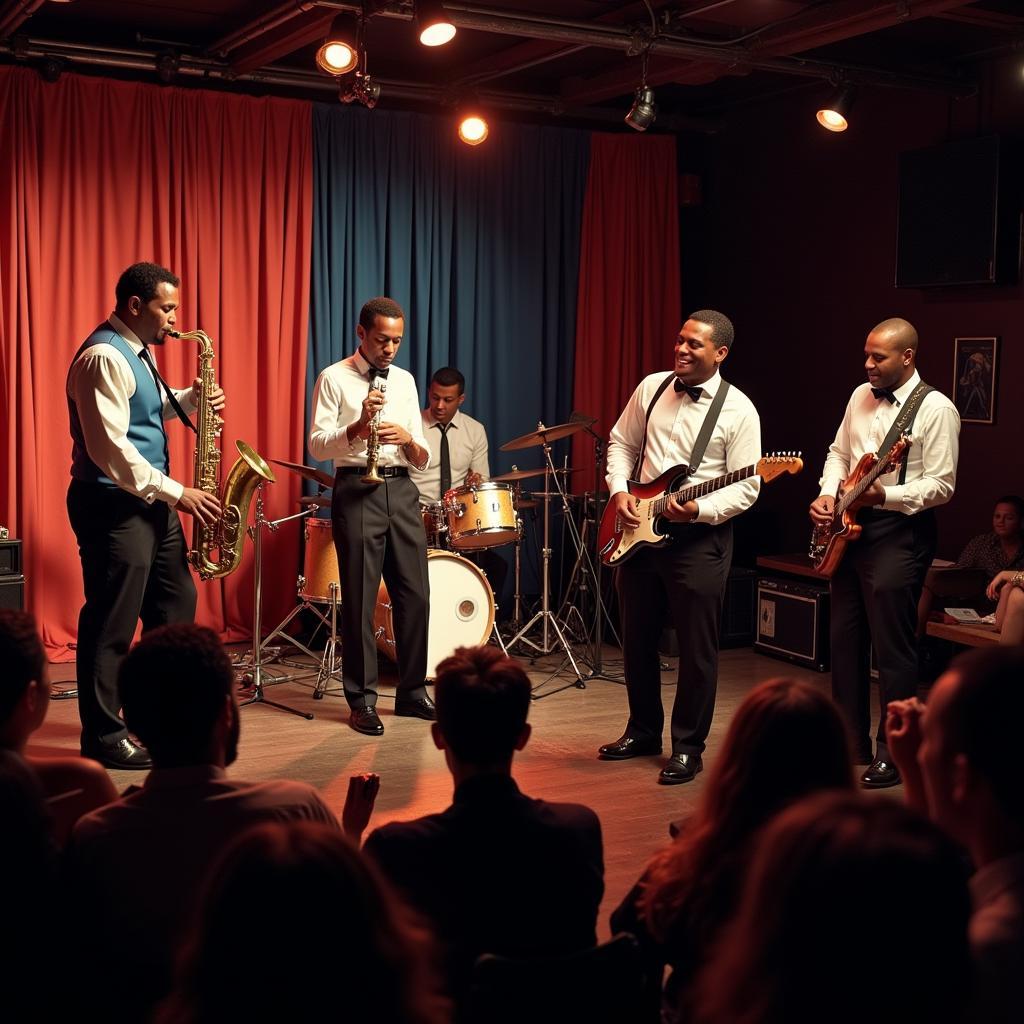A Deep Dive into African American Music History
From its roots in spirituals and work songs to its evolution into jazz, blues, R&B, and hip-hop, African American music has been the soundtrack to struggle, resilience, and ultimately, joy. This article explores the rich history of African American music, highlighting its key genres, influential figures, and lasting impact on American culture and beyond.
The Seeds of a Musical Legacy: Spirituals and Work Songs
The earliest forms of African American music emerged during the brutal era of slavery. Spirituals, infused with Christian beliefs and longing for freedom, provided solace and hope. Sung a cappella, these moving hymns often drew from biblical stories, coded messages of resistance, and the raw emotions of a people yearning for liberation. Work songs, on the other hand, served a dual purpose: to synchronize labor and to offer a creative outlet for expressing the hardships of forced servitude. These call-and-response chants, often rhythmic and repetitive, spoke of everyday life, personal struggles, and the desire for a better future.
 Early Forms of African American Music
Early Forms of African American Music
The Birth of Blues and Jazz: A Fusion of Cultures
The turn of the 20th century witnessed the birth of two transformative genres that would forever shape the landscape of American music: blues and jazz. Emerging from the Mississippi Delta, the blues gave voice to the struggles and sorrows of Black Americans facing poverty, racism, and social injustice. Characterized by its melancholic melodies, expressive vocals, and the use of the “blue note” – a flattened or bent note that creates a mournful sound – the blues resonated with raw emotion and authenticity. Jazz, on the other hand, blossomed in New Orleans, a cultural melting pot where African, European, and Caribbean influences intertwined. Known for its improvisation, syncopation, and complex harmonies, jazz pulsed with an infectious energy and a spirit of innovation.
From Gospel to R&B: Music as a Catalyst for Change
As African Americans migrated north during the Great Migration, their musical traditions evolved and diversified. Gospel music, with its roots in spirituals, flourished in Black churches, offering messages of hope, praise, and upliftment. Artists like Mahalia Jackson and Sister Rosetta Tharpe became iconic figures, using their powerful voices to inspire and move audiences. Meanwhile, rhythm and blues, or R&B, emerged in the 1940s, blending blues, jazz, and gospel influences. With its focus on love, relationships, and social issues, R&B provided a soundtrack for the burgeoning Civil Rights Movement. Artists like Ray Charles, Sam Cooke, and Aretha Franklin became powerful voices for change, their music reflecting the aspirations and frustrations of a community fighting for equality.
 The Evolution of African American Musical Genres
The Evolution of African American Musical Genres
The Rise of Soul and Funk: Black Pride and Identity
The 1960s and 1970s witnessed the emergence of soul and funk, genres that celebrated Black pride, identity, and self-expression. Soul music, with its passionate vocals, heartfelt lyrics, and emphasis on groove, gave voice to the joys, sorrows, and aspirations of Black Americans. Icons like James Brown, Marvin Gaye, and Stevie Wonder became cultural touchstones, their music reflecting the changing social and political landscape. Funk, on the other hand, emerged with its emphasis on syncopated rhythms, infectious grooves, and often-political lyrics. Pioneers like George Clinton and Parliament Funkadelic pushed musical boundaries, creating a sound that was both danceable and thought-provoking.
Hip-Hop Emerges: From the Streets to the Mainstream
Born in the Bronx in the 1970s, hip-hop emerged as a powerful form of cultural expression for marginalized youth. More than just a musical genre, hip-hop encompassed DJing, rapping, breakdancing, and graffiti art. With its roots in storytelling, social commentary, and spoken word, hip-hop provided a platform for voices that had long been silenced. From the pioneers like Grandmaster Flash and the Furious Five, Run-D.M.C., and Public Enemy to contemporary icons like Jay-Z, Beyoncé, and Kendrick Lamar, hip-hop has become a global phenomenon, influencing fashion, language, and social consciousness.
 Modern African American Musical Influence
Modern African American Musical Influence
The Enduring Legacy of African American Music
African American music, from its origins in spirituals to its evolution into countless genres, is a testament to the resilience, creativity, and enduring spirit of a people. It has not only shaped the landscape of American music but has also had a profound impact on global culture. From its influence on fashion and language to its ability to transcend social barriers and inspire movements for social change, African American music continues to resonate with audiences worldwide. It is a powerful reminder of the transformative power of art and the enduring legacy of a people determined to make their voices heard.
Frequently Asked Questions About African American Music History
1. What are some of the key instruments used in African American music?
African American music utilizes a diverse array of instruments, both traditional and modern. Some of the key instruments include the banjo, often associated with early blues and folk music, the piano, prominent in jazz, blues, and gospel, the saxophone, a staple in jazz and R&B, and the drums, providing rhythmic foundation across numerous genres.
2. How did African American music contribute to the Civil Rights Movement?
Music played a pivotal role in the Civil Rights Movement, serving as a tool for protest, unity, and inspiration. Artists like Nina Simone, Sam Cooke, and Aretha Franklin used their voices to advocate for equality and justice, their music becoming anthems of the movement.
3. What is the significance of improvisation in African American music?
Improvisation is a cornerstone of many African American musical genres, particularly jazz. It allows musicians to express themselves freely, creating music in the moment and showcasing their virtuosity.
4. How has technology influenced the development of African American music?
From the invention of the phonograph to the rise of digital recording and streaming, technology has had a profound impact on the creation, distribution, and consumption of African American music. It has enabled new forms of musical expression and broadened the reach of these genres globally.
5. What are some resources for further exploration of African American music?
Numerous books, documentaries, and online resources delve deeper into the rich history and diverse expressions of African American music. Institutions like the National Museum of African American History and Culture and the Smithsonian National Museum of American History offer insightful exhibitions and collections.
We invite you to explore the links within this article to further enhance your understanding of this vibrant and influential musical heritage.
If you need help, please contact Phone Number: +255768904061, Email: kaka.mag@gmail.com or visit Mbarali DC Mawindi, Kangaga, Tanzania. We have a 24/7 customer support team.

